Listen to This Article:
While the fast-paced kitchen environment is one factor that draws people to the culinary world, this same environment can often lead to stress. Whether you’re a recent culinary school graduate starting your first job in a professional kitchen or a seasoned chef managing a team, you’re bound to experience a foggy mind or tense muscles sooner or later.
While not all stress is bad—good stress called eustress can help us grow—the onset of too much negative stress can potentially lead to physical ailments as well as poor job performance. With that in mind, it’s important to address stress head-on.
Rather than pushing this stress to the side, taking steps to manage it in a healthy way can both increase your productivity in the kitchen and improve your health. So keep these six tips in mind the next time you begin to feel your heart racing, focus waning, or panic beginning to form.
1. Know Your Stressors
The first step to managing stress in a professional kitchen is identifying your own unique stressors.
While some people may find the steady stream of tickets during dinner service stressful, others may thrive on this seemingly never-ending list of tasks. At the same time, one person may become overwhelmed by the heat and noise of a kitchen while the person next to them doesn’t even notice the clanging pots and leaping burner flames.
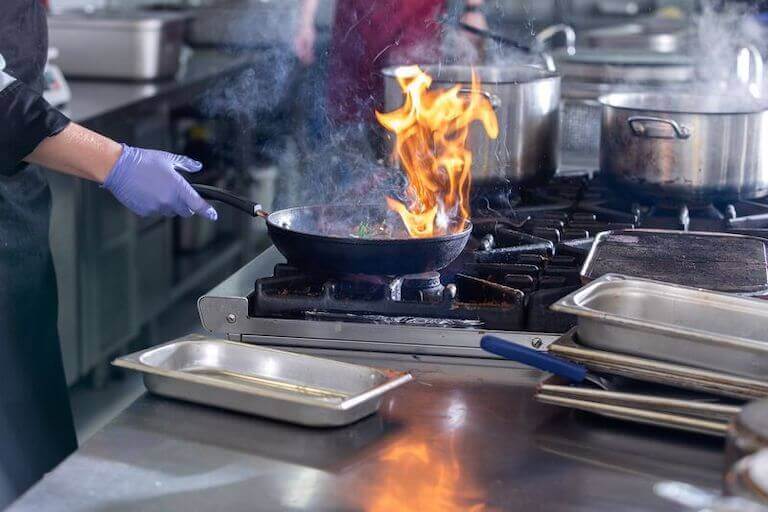
While it’s easy to say your job as a whole–or the dinner rush–is stressful, try to pinpoint the exact item or circumstance you have a hard time dealing with. Once you’ve identified what specifically is causing stress, you can work to address this issue. While you may not be able to eliminate the stressor completely, you can likely develop ways to decrease or cope with this stress when placed in that situation.
2. Organize Your Station and Tasks
When you’re working in a kitchen, you’ll often have a long list of tasks to complete each day. Even if you’re only responsible for a single dish, preparing that recipe may require more than ten ingredients and an even greater number of steps!
To stay on top of these tasks and keep them feeling manageable, organize your to-do list as well as your physical workstation. By separating a big task (like making chicken tagine) into smaller tasks (like creating a spice blend, preparing chicken, and slicing vegetables) your day may feel more manageable. Plus, crossing items off a list can provide you with a sense of accomplishment and empowerment.
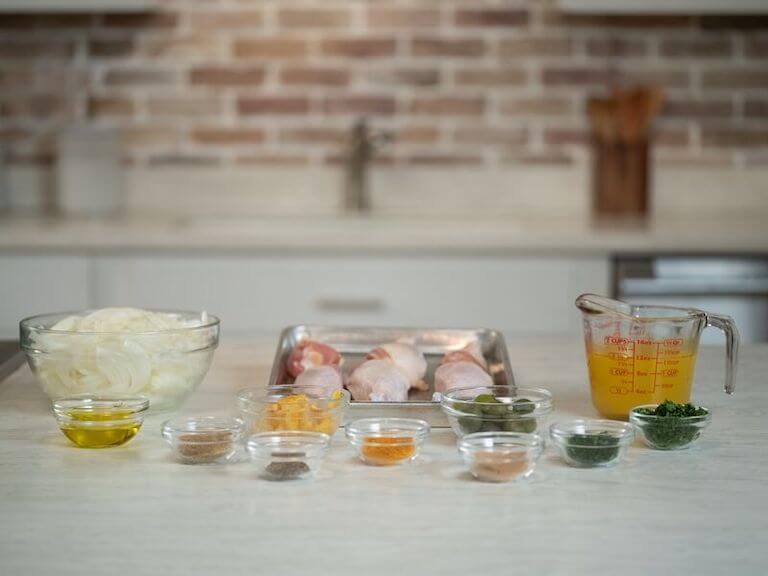
When it comes to your physical workstation, practicing mise en place will ensure you have everything you’ll need to complete a certain task so you can focus completely on the task at hand. Of course, honing your organizational skills can take some education as well as practice. At Escoffier, students can explore how to properly read a recipe and prepare their ingredients and tools early on and then practice these skills throughout the rest of their programs.
3. Strive for Efficiency
After you’ve organized what you need to do each day, figure out how to complete these tasks as efficiently as possible. This may involve learning how to use specialized tools like mandolins and zesters with greater proficiency or sharpening your knives so they slice with ease. If you find your knowledge isn’t quite where you’d like it to be, you may benefit from enrolling in online cooking school.
Along with thinking about your skills, consider how to limit the number of unproductive actions or movements you take. For example, try enacting a “full hands” policy so you never go anywhere in the kitchen without bringing something with you. If you need to restock an ingredient at your station, which dirty plates can you bring to the dish pit on your way? If you have a stack of pots that need washing, grab a spare kitchen towel or a few clean pans on your way back to the line.
“I would say one of the important lessons is attention to detail, for sure. It’s how you place your knife down next to your cutting board. It’s how you fold your towel. It’s the movements that you make in the kitchen. There’s no wasted movement, it’s all choreographed.”*
Bob Scherner, Executive Chef at Escoffier’s Boulder Campus
Next, look to reduce travel between kitchen stations. Let’s say there’s an ingredient that you regularly use as a garnish, but it’s kept several feet away in another station. Instead of taking those extra steps, stock a bit more of the ingredient at your station to prevent going back and forth.
By working efficiently, you’re less likely to become overwhelmed by getting behind on your work and slowing down other members of your team.
4. Take Deep Breaths
Even if you’ve done your best to limit the negative stressors you face, there will still be times when you feel a bit overwhelmed. When this happens, you may find your breathing becomes quick and shallow, a process that can further increase stress.
To stop this cycle of stress development, pause for a moment to take a few slow, deep breaths. This can serve as a reminder that you are in control of your actions, including how you respond to the environment around you. It’s much better to take a brief moment to collect yourself than snap at team members, make mistakes in a recipe, or forget safety protocols due to a high stress level.
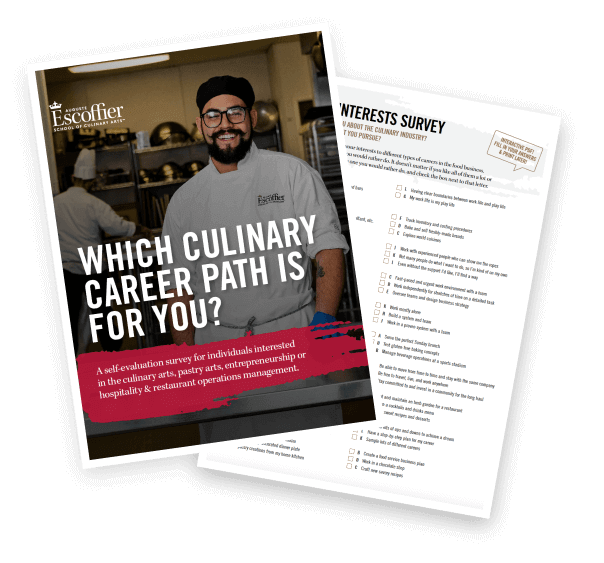
Take the Culinary Career Survey
We’ve compiled a checklist of all of the essential questions into one handy tool: career options, culinary interest surveys, educational opportunities, and more.
5. Take Care of Your Body
Along with causing mental symptoms like anxiety and lack of focus, stress can also lead to physical symptoms such as tense muscles, headaches, fatigue, and digestive issues. When you think about managing these physical symptoms during your time working in the kitchen, you may find yourself becoming even more stressed.
To counteract both the physical and mental effects of stress, do your best to take care of your body in and out of the kitchen.
Although kitchen jobs are often physically demanding, you should try to exercise outside of work. The American Physiological Association reports that regular exercise can both provide a short-term mood boost as well as help with chronic stress. When individuals exercise regularly, they can better manage potentially panic-inducing moments as well as longer-term depression.
Along with exercising, aim to get seven to nine hours of sleep each night. While this may seem like a tall task, research shows that adults who get at least eight hours of sleep each night are less likely to feel irritable, overwhelmed, and fatigued.
When you’re in the kitchen, make sure to wear supportive footwear and be mindful of your posture. You should also take time to drink water during busy shifts and eat healthy snacks that can power you through the day.
6. Ask for Help
The best chefs know they can’t do their jobs alone, and they aren’t afraid to reach out for help.
When you’re working in the kitchen, learning how to effectively delegate tasks may not only alleviate some of your stress, but also help keep the kitchen running smoothly. In order to delegate, you’ll need to be able to see when you’re in over your head and learn how to communicate with other members of the brigade de cuisine.
While asking for help in the kitchen may decrease some of your stress, it’s also important to know when you need outside help. If you’re feeling overwhelmed by stress, consider talking to a professional counselor. These people may be able to provide you with specific ways you can both reduce and cope with stress.
“[I love] seeing the lights come on when a student really grasps something that maybe they were afraid of. They get scared when they don’t have the confidence. They have no idea… how you could possibly make that at home. To see them when they do accomplish something like that….they start to see that what they thought was impossible is possible.”*
Christopher Diehl, Chef Instructor
Prepare for the Kitchen in Culinary School
Can being a chef be stressful? At times. But by proactively managing stress in the kitchen, you can continue to stoke your passion about your profession and keep yourself physically and mentally at your best.
Along with learning how to manage stress, entering the kitchen feeling prepared may help you go through your days with confidence and ease. One way to explore the techniques and skills that can help you excel in the kitchen is to attend culinary school.
Escoffier culinary school students can explore concepts including knife skills, flavor development, food safety, and more as well as complete at least one industry externship. To learn more about whether culinary school could help you prepare for a career, contact us today.
To learn more about life in the kitchen, check these out next:
- Are the Culinary Arts a Good Career Choice for You?
- The Difference Between a Cook and a Chef
- What it Takes to Be an Executive Chef
*Information may not reflect every student’s experience. Results and outcomes may be based on several factors, such as geographical region or previous experience.
This article was originally published on December 12, 2015, and has since been updated.

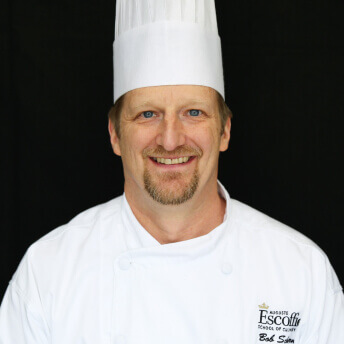 “I would say one of the important lessons is attention to detail, for sure. It’s how you place your knife down next to your cutting board. It’s how you fold your towel. It’s the movements that you make in the kitchen. There’s no wasted movement, it’s all choreographed.”*
“I would say one of the important lessons is attention to detail, for sure. It’s how you place your knife down next to your cutting board. It’s how you fold your towel. It’s the movements that you make in the kitchen. There’s no wasted movement, it’s all choreographed.”*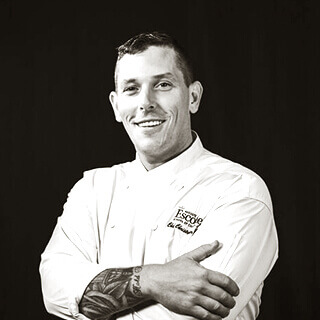 “[I love] seeing the lights come on when a student really grasps something that maybe they were afraid of. They get scared when they don’t have the confidence. They have no idea… how you could possibly make that at home. To see them when they do accomplish something like that….they start to see that what they thought was impossible is possible.”*
“[I love] seeing the lights come on when a student really grasps something that maybe they were afraid of. They get scared when they don’t have the confidence. They have no idea… how you could possibly make that at home. To see them when they do accomplish something like that….they start to see that what they thought was impossible is possible.”*